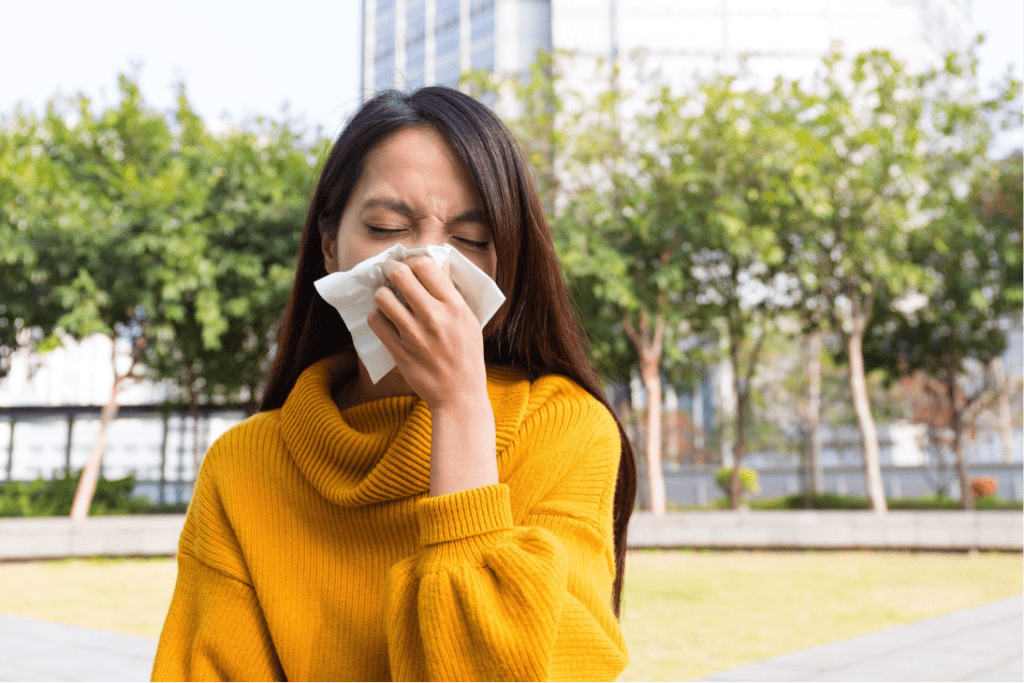
Sniff, sniff … allergy season is here again
For those of you who suffer with seasonal allergies, you don’t need to be reminded that Spring has arrived. In the UK tree pollen kicks the season off as early as February, followed by grasses May to July and weeds June to September. If you’re unlucky enough to suffer several allergens this can be a long, unpleasant season that can impact your quality of life, leave you exhausted from lack of sleep (up to 50% of sufferers report hayfever impacts their sleep (Office for National Statistics Population, 2012) and generally make you feel lousy. It can also be costly to the workforce with hayfever thought to cost the UK economy up to £7.1 billion per year in lost productivity with around 15% of sufferers reporting they have missed work due to their symptoms. The number of hayfever sufferers is on the rise (Royal College of Physicians, 2003), with the UK now in the top 3 countries for the highest incidence of allergies.
What is hayfever?
Also called seasonal allergic rhinitis, it is an allergic response to pollen and is believed to affect 1 in 4 people in UK. Symptoms include sneezing, itchy eyes and throat, and runny or blocked nose. Up to 40% of people who suffer hayfever will develop asthma (Pal et al., 2013).
Histamine is the chemical responsible for the symptoms we experience with hayfever. Our bodies produce histamine (e.g., during an allergic response) and it also occurs naturally in some foods. Histamine’s main role is to trigger an immediate inflammatory response to ward off attackers – in this case pollen. If you take one of the many over-the-counter hayfever remedies available you will notice they are generally anti-histamines and work to reduce the symptoms associated with increased histamine.
How can you help minimise the effects of hay fever?
Avoid foods high in histamine as they can add to the body’s overall histamine levels. These include:
- Alcohol, especially red wine (have you noticed some people get flushed after drinking red wine?), beer and spirits which contain histamine
- Mature cheese
- Tomatoes
- Chickpeas
- Strawberries
- Chocolate (yes, really!)
- Processed foods
- Fermented foods (sauerkraut, pickles, kefir, fermented soy products)
- Yoghurt
And avoid inflammatory foods such as sugars, processed foods and trans fats
Certain foods may help reduce histamine levels:
- Eat foods rich in quercetin, an antioxidant flavonoid which may inhibit the production and release of histamine. Sources primarily include fruit and vegetables, particularly citrus, apples, dark berries such as blueberries, blackberries, cherries, grapes, onions, garlic, parsley, sage, olive oil
- Pineapple contains bromelain (make sure you eat the core where levels are highest), an enzyme which has anti-inflammatory properties that may help minimise discomfort associated with inflamed nasal tissue, and also improves the absorption of quercetin
- Omega-3 fatty acids are associated with a decreased risk of allergic rhinitis (Hoff et al., 2005). Include oily fish in your diet (e.g., mackerel and sardines). Alternatively consider a high-quality fish oil supplement
- Increase anti-inflammatory foods – fruit and vegetables, salmon, ginger, garlic, turmeric, cinnamon, flax seeds
- Consider taking a good probiotic supplement to support the immune system. A recent study by the University of Florida showed that taking a combination probiotic helped to alleviate symptoms (Dennis-Wall et al., 2017).
Lifestyle steps to minimise exposure to pollen:
- Check for pollen updates. The Metoffice provides daily updates http://www.metoffice.gov.uk/health/public/pollen-forecast. Try to minimize your time outside when the pollen count is high, and keep windows shut both at home and in the car
- Keep a clean house and vacuum regularly, especially if you suspect a sensitivity to pet hairs. Swiftly remove any mould that may build up in cold, damp areas
- Don’t have fresh flowers in the house
- Avoid hanging clothes outside to dry
- Wear sunglasses when outside to protect your eyes. You can also consider wearing a mask to help minimize inhaling pollen
- Before reaching for antihistamines try the following drug-free products available at pharmacists. Saline nasal sprays used daily during pollen season which acts as a ‘nose wash’ to rid the nose of pollen and helps clear blocked noses. Additionally, topical barrier balms help block allergens from entering the nasal passage
- When you return home shower and wash your hair to remove pollen and change your clothes
References:
Office for National Statistics Population (2012) Accessed: http://www.nasalguard.co.uk/Allergy_Statistics_UK_a/267.htm April 2017.
Royal College of Physicians (2003) Allergy: The unmet need A blueprint for better patient care. Accessed: http://www.bsaci.org/pdf/allergy_the_unmet_need.pdf April 2017.
Pal et al (2013) Flavonoids: a powerful and abundant source of antioxidants. International Journal of Pharmacy and Pharmaceutical Sciences, 5 (3), 95-98.
Hoff S, Seiler H, Heinrich J, Kompauer I, Nieters A, Becker N, Nagel G, Karg G, Wolfram G, Linseisen J (2005) Allergic sensations and allergic rhinitis are associated with n-3 polyunsaturated fatty acids in the diet and in red blood cell membranes. Eur J Clin Nutr 59(9): 1071-80, [Online] PubMed (https://www.ncbi.nlm.nih.gov/pubmed/16015268). Accessed: 21 April 2017.
Dennis-Wall JC, Culpepper T, Nieves C, Rowe CC, Burns AM, Rusch CT, Federico A, Ukhanova M, Waugh S, Mai V, Christman MC, Langkamp-Henken B (2017). Probiotics ( Lactobacillus gasseri KS-13, Bifidobacterium bifidum G9-1, and Bifidobacterium longum MM-2) improve rhinoconjunctivitis-specific quality of life in individuals with seasonal al. The American Journal of Clinical Nutrition, 2017; 105 (3): 758 DOI: 10.3945/ajcn.116.140012 [Online] PubMed (https://www.ncbi.nlm.nih.gov/pubmed/28228426) Accessed: 23 April 2017.
